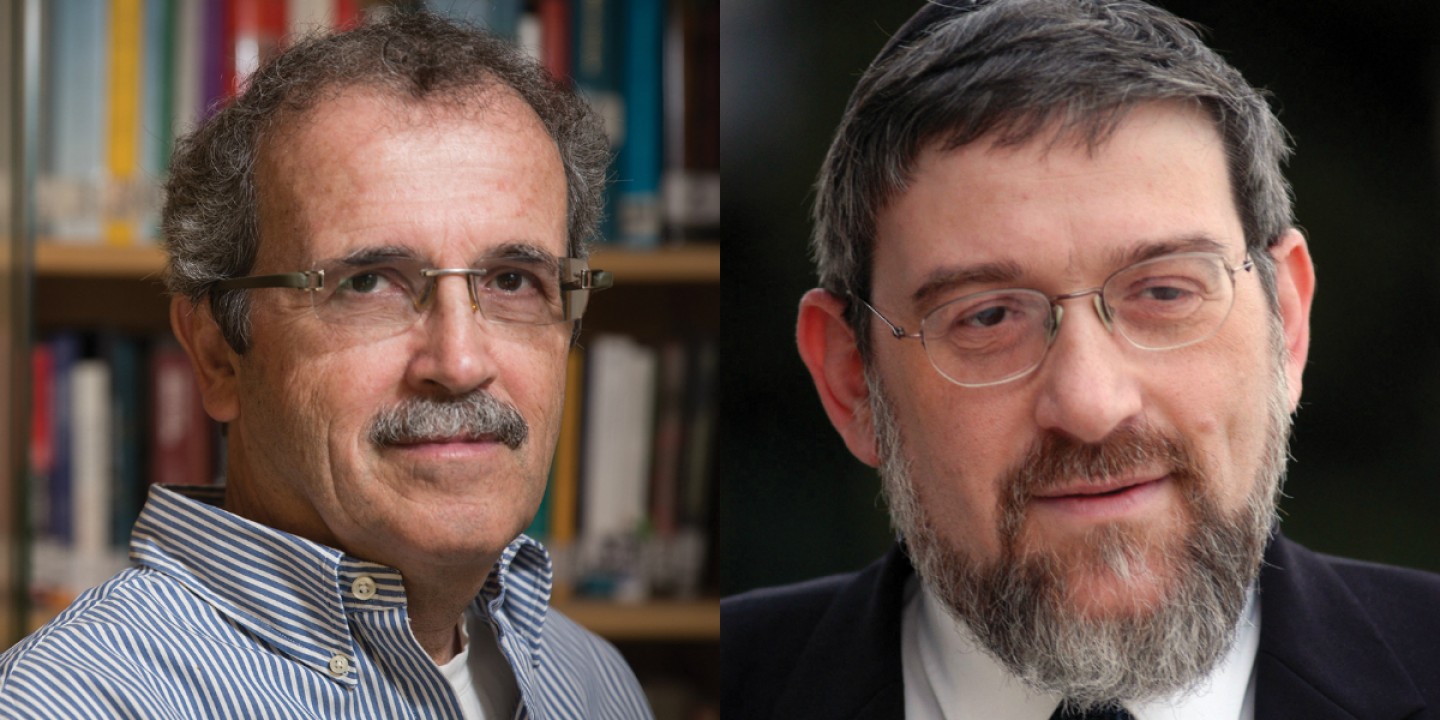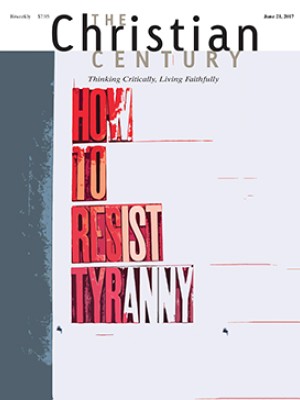What makes Israel a Jewish state?
Two Israelis, a lawyer and a rabbi, on the complicated relationship between religion and national identity

When the state of Israel was founded in 1948, a new question arose for the Jewish people as a whole and for the inhabitants of this unique territory in particular: What exactly had they inherited? They had gained a country, that much was clear. But what sort of nation was going to be built within its borders?
Some Israelis looked back at historical precedents—the first and second commonwealths of the First Temple and Second Temple periods. Others, like the writer S. Y. Agnon (Israel’s first Nobel Prize winner), desired a theocracy rooted in Jewish law. But most Zionist pioneers and politicians—chief among them the state’s founder and first prime minster, David Ben-Gurion—wanted a secular state run on democratic lines and freed from religion of any kind.
Read our latest issue or browse back issues.
Although the state of Israel has been flourishing for almost 70 years, many questions about the nature of the state remain unresolved and in some ways are more complicated than ever given the increasing number of religiously observant Jews. So when Prime Minister Benjamin Netanyahu declared in 2014 that he wanted Israel to be known officially as a Jewish state, or as the Jewish state, he raised hackles of all sorts both inside and outside of Israel.
What exactly did Netanyahu—himself a secular Jew—mean? A theocracy? A Jewish-style Iran? Were there to be moral police checking adherence to the laws of Moses? Would foreign policy be driven by biblical precedents? Former justice minister Tzipi Livni spoke for many when she declared her opposition to “any law that gives superiority” to the Jewish nature of the state over the country’s democratic values.
Despite having different political views from Ben-Gurion, Netanyahu adheres to the founder’s secular vision of statehood. His argument is that the Jewish people have a secular history alongside a religious one. The development of the Jewish people can be identified in purely material terms (sociological, economic, geographical, linguistic, etc.). Jews’ claim to statehood is a natural outcome of their historical situation. The Jews were driven out of their land by force some 2,000 years ago, and they had every right to return to their historical homeland, which they have done over the past 200 years.
In recent years, mainstream opinions about the meaning of a Jewish state—among both religious and secular Jews—have moved to the right. As the religious community has grown in influence, it has pushed for laws on the public keeping of the sabbath, for rules on kosher food, and for religious norms to apply in the military, especially regarding the role of women. It has also argued for more extreme positions on foreign policy. All these stances have been supported by the right-wing government.
Up to now a form of democracy has been in place in Israel, with free elections, a critical media, a plethora of political parties, and religious freedom. Does the Jewish religion have something to say about what is the best form of government? What is the “Jewish content” of a Jewish state?
I put these questions to two religious thinkers, one a rabbi and peace activist, the other a religiously observant professor of law. Both are uneasy with the direction the country has taken as regards its Jewishness.
For Rabbi Michael Melchior, an Orthodox rabbi and former member of the Knesset, talk of a Jewish state brings to mind a medieval book called the Kuzari, written by the Spanish rabbi Yehuda Halevi. It contains a purported dialogue between the king of the Khazars and a Christian, a Muslim, and a Jew, with the aim of discovering which of these religious paths the king and his people should follow.
“The only question the rabbi in the book cannot reply to,” observes Rabbi Melchior, “is when asked by the king, ‘What happens when you regain your country and all the fine ideals that you possess confront reality. Will power corrupt you?’ The rabbi says he cannot honestly answer.”
Looking back at biblical history, Melchior sees “a very clear battle between the power of the kings and that of truth and justice as voiced by the prophets. The prophets’ words inspire us till today, while most of the kings’ names have been forgotten. The prophets, who confronted those in power, spoke the truth. Their words have lasted, not only among Jews but also Christians and Muslims. Is this a model for today, when political power is more prevalent than ethical, human values?”
Melchior is especially concerned about how Jewishness has been defined in the struggle to make peace with Palestinians who live in the West Bank and Gaza, land occupied by Israel after the Six-Day War of 1967 (Israel relinquished control of Gaza in 2005).
“Because peace was seen as a secular project, many religious people were against it. They felt that any peace would mean giving up the land of Israel. It was seen as a project to make Israel ‘normal’ or Western. It would weaken the Jewishness of the Jewish state. This was not a project of which they wanted to be part. . . . They didn’t wish to give up their traditions for a peace which might or might not work.”
Melchior thinks it’s a mistake to try to bypass people’s religious identity when striving for peace. “If we want to make serious peace—not like the attempts that have been made in the last 25 years—it can only come from the religious on both sides.” He notes that today 50 percent of children in Israel go to religious schools—double the number of a generation ago—and that religion plays a major role in the private and public spheres of the country. “This isn’t necessarily a bad thing for peace. It’s just that you have to figure out how you make peace. You have to rethink your strategy. You can’t have peace as a secularized idea.”
For Melchior, religious identity should spur action for peace. “The Jewish people are in the land of Israel not just to survive. We are here in order to create a model society and to be a blessing to the nations . . . Our purpose is tikkun olam bemalchut shadai (“The repair of the world through the grace of God”).
Yedidia Stern is also a religious Jew, and he is also critical of the ways religion has entered into Israel’s political and social life. Stern is former dean at Bar-Ilan University Law School, vice president of research at the Israel Democracy Institute, and author of many books and articles on Israeli democracy.
In his reading of Jewish tradition, Stern finds little material that helps define a Jewish state. “There seems to be no agenda as to how we deal with the challenge of a Jewish state, even if it were run by Orthodox Jews. The truth is that Judaism did not prepare itself for a state. Halacha (law) as we know it today was formed in the diaspora, when Jews were not in control of their destiny and didn’t own any specific territory. And the halacha before this period of exile—say, from the Second Temple period—is not relevant. We created a legal system based on the assumption that we are individuals, families, communities, but not a sovereign state. We hardly had any ‘public goods’ to share.”
Stern helped edit a two-volume work called Zionist Halacha which explores how halacha has tried to respond to Zionism. “So far most of the challenges are unanswered,” he said. “Take a rabbi and ask him to be head of social services,” he offered as illustration. “He will relate to the laws of zedaka (charity). But those laws apply only to the individual; they are not relevant as applied to the state. Or take an expert in halacha and ask him to apply it to the army. Do we have any laws that tell us how the army can use force in a Jewish way?”
Stern suggests that such projects of applying halacha to issues of governance may be too problematic to attempt— which is “what the haredim [ultra-Orthodox] say.”
Before 1948, Stern said, Zionist politicians thought that the question of Jewish identity would be solved by having a common territory, language, and state. But “just the opposite has happened.”
“As an alien community, you can maintain different identities, different systems of belief. In a state, you have to make decisions which obligate everybody. . . . This is partly the conflict between religion and state—but it is much more than that. Who are you, what do you want?”
Referring to the various “tribes” of Israel—often designated as religious Jews, secular Jews, ultra-Orthodox Jews, and Arabs—Stern notes that the different Jewish tribes “do not necessarily share the same aims or destiny as each other.” Even within Orthodox Judaism, he said, people have different goals and aims.
Stern points to the assassination of Prime Minister Yitzhak Rabin in 1995 to illustrate the difficulty of applying halacha to public life. In fiercely opposing Rabin’s efforts to make peace with Palestinians, some rabbis invoked the Talmudic law of the pursuer, which offers a justification for killing a person in self-defense. These references to Jewish law were then used to offer a justification for Rabin’s murder. Rabin’s rabbinic opponents, Stern said, were “applying private law to a public issue, not understanding the difference.” Stern’s conclusion: “Halacha is not up to the national challenge.”
Nevertheless, Stern doesn’t reject Netanyahu’s claim that Israel should be recognized as a Jewish state, especially by Arabs and Arab countries. A long-held Arab view is that being Jewish has to do with a religion and doesn’t have anything to do with a state. As Stern explains it, “Netanyahu wants to push the idea of a Jewish state so that other nations will say: ‘Yes, you are a nation among the nations.’” Stern thinks most Jews in Israel agree that Israel should be recognized as a Jewish state. “The details of it are in dispute, not the general premise.”
Though earlier generations of political Zionist leaders wanted to distance the country from diaspora Judaism, the situation is different today. “Nowadays you cannot be a serious public figure in Israel if you don’t show some kind of affinity with Jewish tradition. Jewish tradition is the one major identity trait for Jews in Israel. The number of Jews living in Israel believing in God is 80 percent.”
Stern has no doubt about how the Jewish state will be judged by future historians. “I think we will be judged on how we dealt with the Other, mainly the Arabs. And I’m not sure that we are doing the best we can. We should grant everyone equal rights, which we are not doing. As a religious Jew, I have an obligation to change this situation.”
Recalling the Exodus story, Stern said, “The ‘mixed multitude’ who accompanied us out of Egypt were, according to the tradition, the very Egyptians who were murdering us. Yet right after the Exodus is the verse, ‘There is to be one law for you and the stranger who dwells among you.’ We have to treat them equally. After 70 years we should have done better. This is our major test.”
A version of this article appears in the June 21 print edition under the title “What is a Jewish state?”






